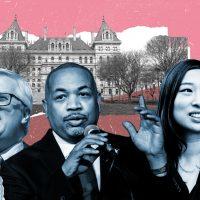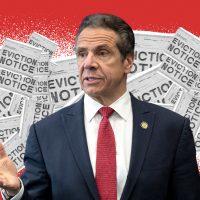UPDATE, Sept. 29, 5:55 p.m.:Landlords’ hopes for an end to the state’s limits on evictions were dashed Tuesday after Gov. Andrew Cuomo issued his latest executive order.
In the order, issued Tuesday afternoon, Cuomo broadened the scope of existing legislation to apply to pre-Covid evictions, rather than extending a blanket pause on commercial and residential evictions that lapses on Oct. 1.
The Tenant Safe Harbor Act allows landlords to obtain money judgments against tenants but not evict them in certain cases. The modification also allows the legislation to apply to outstanding pre-Covid warrants.
The Office of Court Administration said it will issue further guidance after it decides how it will treat the executive order. Meanwhile, City Marshals have not yet updated an August memo that said they would not carry out any evictions until Oct. 1.
“We are still in the process of interpreting the executive order and how cases would be handled,” a court spokesperson said.
Read more



In the aftermath of Cuomo’s announcements, both multifamily property owners and tenants aired grievances about the eviction guidance. Landlords have noted that limiting evictions makes it harder to collect rent — and hinders them from giving non-paying tenants the boot.
Sherwin Belkin, a partner at Belkin Burden Goldman, said that landlords feel that only renters’ side of the equation is being examined.
“There is no doubt that many tenants have suffered Covid-19 financial hardship,” said Belkin. “But many owners are suffering greatly as well.”
Rent collection has been down since the onset of the pandemic, more apartments are sitting vacant, and landlords are resorting to concessions to attract tenants. Asking landlords to bear the burden of tenants who can’t pay rent is “inequitable and not sustainable,” Belkin added.
Although the announcement — which will expand the number of tenants who can raise financial distress as a defense against eviction — was not welcomed by landlords, tenant leaders were also quick to denounce it.
A joint statement from the Right to Counsel Coalition and Housing Justice for All called the extension “misleading and disingenuous.” Among their concerns is that not all tenants will be able to prove financial distress and the Tenant Safe Harbor Act does not prevent holdover evictions.
“Cuomo is not going to save us from this,” said Cea Weaver, coordinator for Housing Justice for All. She added that Senate Majority Leader Andrea Stewart-Cousins and Assembly Speaker Carl Heastie, who have largely taken a back seat to Cuomo in the state’s response to the pandemic, have an opportunity to prevent evictions from starting in October.
They have “stood up for renters before, and I am sure they will do so again,” Weaver said. “But we need them to return to session.”
Numerous bills that could affect real estate are before the legislature, but Albany sources say there is no plan for lawmakers to convene before the November election.
Judith Goldiner, an attorney at Legal Aid Society, said in a statement that Stewart-Cousins and Heastie should “fill this void in leadership.”
“A package of legislation that would provide the robust relief that our clients deserve has been pending in the Legislature for months, ready for a debate and a vote,” Goldiner said. “We call on Legislators to advance these measures immediately.”
UPDATE: This story was updated to clarify the intent of Cuomo’s executive order, and include information from Empire State Development. It was also updated with a quote from the Legal Aid Society.
